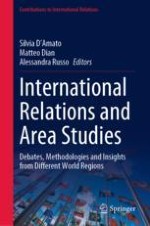Discover the intricate tapestry of international politics and governance with this book. The book delves into the diverse nature of globally significant actors and systems across multiple regions. From Africa to Asia, Europe to the Middle East, this collection of thought-provoking case studies explores the role of regional actors in the international system. Combining theoretical innovation with empirical analysis, this volume expands the boundaries of International Relations (IR) and Area Studies (AS), showcasing their interconnections throughout history and in contemporary contexts. Through illuminating case studies drawn from the fields of "Comparative Regionalism" and "Non-Western IR Theory," the book sheds light on pressing international events. Unpacking complex questions, the contributors examine the application of IR scholarship to global events and provide fresh insights into political dynamics, conflicts, and state instability across various regions. By offering a comparative perspective on threats, political contestation, and security policies, this book challenges existing perspectives and enriches the debate. With its methodological and epistemological explorations, this book is an indispensable resource for scholars and students of international relations and security studies, as well as researchers focusing on specific world areas. Embark on a captivating journey through the multifaceted landscape of global affairs.
